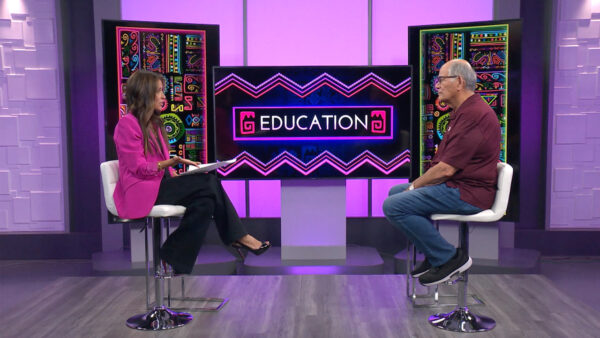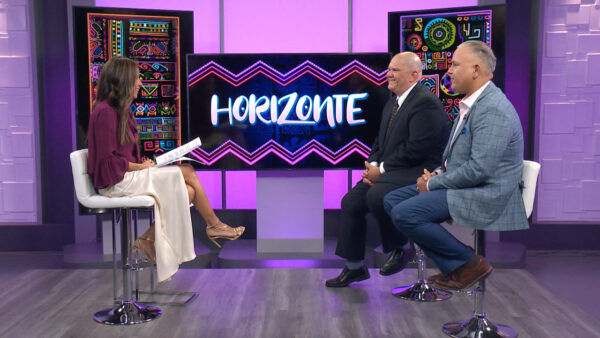A federal civil rights lawsuit makes allegations that Sheriff Joe Arpaio and his deputies used racial profiling during illegal immigration sweeps by the Maricopa County Sheriff’s Office in 2007. David Bodney, the attorney for the plaintiffs, talks to HORIZONTE about the lawsuit.
José Cárdenas: Sheriff Joe Arpaio is outspoken when it comes to his tough stand against immigration issues. But last December, a different side of the sheriff emerged as he answered questions on videotape and under oath for a federal civil rights lawsuit in which a family alleges that Maricopa County sheriff's deputies unreasonably detained them back in 2007. Sheriff Arpaio was asked to account for some of his own words in the past. He was questioned regarding accusations. We will hear from the plaintiffs' attorney, but first, here some portions of that deposition.
David Bodney: Do you view illegal immigration as a threat to our country? As Joe's law says on its cover?
Joe Arpaio: I don't think I -- I'm -- I put that title up there.
David Bodney: That was your coauthor's title?
Joe Arpaio: Or the publisher.
David Bodney: Uh-huh. But I think you testified that illegal immigration is in your view a threat to America.
Joe Arpaio: No, I think -- when you say threat, I don't look it as terrorist threats. Illegal immigrants commit other crimes as evidenced by the statistics. I don't call it a threat on America, per se.
David Bodney: You said the MCSO was targeting profile vehicles and quickly becoming a full-fledged anti-immigration agency. Do you remember issuing a press release on that subject?
Joe Arpaio: I don't remember.
David Bodney: And the line beneath the headline, I quote, hundreds of deputy, slash, volunteer posse targeting vehicles. Do you see that?
Joe Arpaio:Uh-huh.
David Bodney: What does it mean to target profile vehicles?
Joe Arpaio: Once again, I didn't write the press release.
David Bodney: Second paragraph and looking at the statement that says, you know what it is? It's this civil rights. All that crap. Closed quote. Do you remember making that statement to the reporter this year?
Joe Arpaio: I don't remember. I've had so many reporters I talk to.
David Bodney: But is that your view of this racial profiling allegation, that it's just a civil rights crap?
Joe Arpaio: Well, I'm not going to get into all the facts, why I feel that way, but I do realize it's political and I -- I have full confidence in my staff. How they conduct themselves in this illegal immigration.
David Bodney: And what intelligence gathering did you gather?
Joe Arpaio: I'm sure the chief, it's delegated to him. You can ask chief Sands. I don't believe we keep a record of those contacts we make during an operation -- once again, chief Sands can elaborate more on that operation.
David Bodney: Do you remember discussing racial profiling?
Joe Arpaio: I don't recall ever saying that.
José Cárdenas: It was your voice we heard in the deposition clips. At one point, it seems that he's acknowledging that he does view this as civil rights crap. Do you think that's his view of this?
David Bodney: He's shown a stunning disengagement with the risks of racial profiling. Those were his words. It's disconcerting.
José Cárdenas: before we talk more about what the sheriff said, give us background of your lawsuit. The factual basis.
David Bodney: It's a lawsuit brought in federal court on behalf of a husband and a wife. A brother and a sister -- U.S. citizens. A retired schoolteacher. A Mexican national, and one organizational plaintiff, Somos America. The claims are violations of the United States constitution. The 14th amendment. Equal protection clause. The 4th amendment, unreasonable searches and seizures and related claims under the Arizona constitution. In a nutshell, the claims boil down to the experiences of persons who are Latinos or who appear to be Latinos, driving in motor vehicles in Maricopa County, who are stopped, detained, interrogated, harassed, based on race.
José Cárdenas: Give us an example of some of the experiences that these people had.
David Bodney: Sure, the -- Manuel Ortega, the lead plaintiff, is a retired school teacher from Mexico, here legally. He's a passenger in a vehicle that's pulled over for speeding. No citation issued. He's handcuffed and humiliated and detained for upwards of eight hours. No water, no attorney. He's taken to ICE and the officers there essentially ask the sheriff's department officials, why are you detaining this person? What has he done? And he's let go. But he had an injury to his wrist. He explained this to the officers. He was hurt and placed in fear that such an incident could happen again. Not -- not unrealistically.
José Cárdenas: As I understand it, one of the plaintiffs is the assistant to the mayor of the city of Phoenix who was detained. In some circumstances that were a bit surprising. Explain that to us.
David Bodney: Again, driving with her husband and child in a vehicle, along a road that was pointed out to them to be closed by one of the sheriff's officers. It wasn't readily apparent that the road, was closed. Of the several cars stopped by sheriff's deputies, there was only one that received a citation and it was her car for having the audacity to ask questions about why was she was being pulled over, about why she was being asked to show citizenship kinds of papers and that kind of thing. The brother and sister were taking a break from work. Just drove a short piece down the --
José Cárdenas: This is another set of plaintiffs?
David Bodney: Another set. Taking a break from work at their father's auto repair shop while a sweep is taking place and a deputy has detained a couple of other individuals. They pull into a convenience store to get sodas and whatever, and listening to a Latino radio station. Windows are down. Not at great volume, nothing disturbing the peace. And the officer approaches them and tells them to leave is very abrubpy with them and is disrespectful but they don't fight with him, and they leave. They watch him radio to other officers and in the short distance back to their place of business, they're followed by several sheriff's deputies vehicles and pulled over and when they are, the doors are opened and the brother has his face smashed up against one of the windows of the car, guns are drown on him, they're calling 9-1-1 for assistance when this is happening, they're so concerned and frightened and it isn't until their father noticing what is going on. Comes out from the shop and there are people there and it's disruptive and he asked what are you doing, these are my children. They're citizens and with the last question, does this incredible behavior come to a stop. And it's the kind of behavior that needs to come to a stop county wide.
José Cárdenas: You mentioned rough treatment of this young man. You talked about Manuel ORTEGA's injury to his wrist. Are they seeking damages?
David Bodney: They are not. It's not about money damages. It's not folks seeking filthy LUCRE. These are of people whowill sue, we hope in a class action, on behalf of all Latinos, or people who appear to be Latinos in motor vehicles in Maricopa County, requesting injunctive and declaratory relief. Which is to say an order from a federal court announcing that this behavior is unconstitutional under the 14th and 4th amendments. And to establish best practices for the Maricopa County sheriff's office. Not asking for a lot. We're asking them to follow the kind of best practices that professional law enforcement agencies across this country follow. But they have not agreed voluntarily to take those minimal steps to reduce the risks of racial profiling.
José Cárdenas: What steps do they take to reduce those risks?
David Bodney: Well, the sheriff himself has received no training on racial profiling and said at his deposition, he doesn't think it's necessary. And the sheriff's office, according to the sheriff. offers no training on racial profiling. And there's not a system to ensure that racial profiling is reported and corrected promptly. The kinds of basic best practices that other law enforcement agencies follow. That's essentially what needs to be cured here. But an absence of an interest in doing so. They don't have their own racial profiling program or training, guidelines, some of their officers have been trained by federal officials under section 287-G and some of those officers, therefore, presumably have received that degree of training but nothing independent established by the Maricopa County sheriff's office to address this issue.
José Cárdenas: I understand the sheriff offered his own thoughts how he could determine whether somebody was in this country illegally.
David Bodney: Well, he has. He has spoken to many media about this issue and we asked him about this at his deposition. He's indicated there are ways to tell if someone is here illegally. He's identified some of those things. He's indicated that if someone is speaking Spanish and appears to be dirty, those are factors that people can consider. He's indicated, of course, that skin color is one indicia of someone being here illegal. So when you combine these factors, it's an incredible risk and a message that comes from the top down to all these officers responsible for carrying out the policies of Sheriff Joe Arpaio.
José Cárdenas: The sheriff seemed to be unfamiliar with the allegations in the complaint. He seemed to be unfamiliar with his press releases and other statements attributed to him. Even with his own book. Did that surprise you?
David Bodney: It was surprising. Particularly the questions with respect to his own parents' experiences as immigrants as set forth in his book. I expected him to simply validate those statements in the book, as he had validated the statements about being able to identify someone who is illegally as being dirty or speaking Spanish or having brown skin and yet he said that those statements that Mexicans are different from every other immigrant because they don't have the same hopes and because they believe in reconquista there wanting to take back Arizona and New Mexico, those statements that appear in his book, anchored to his parents' experience, he said he didn't write. Yes, that was surprising.
José Cárdenas: You had discussion either in the deposition or in the course of the lawsuit, about the motivation for some of the raid that's the sheriff has launched. One in mesa, for example.
David Bodney: Right, they conduct sweeps. And they seem to believe they can conduct sweeps whenever they want. As long as there's crime occurring in Maricopa County, they can conduct a sweep. So when someone affiliated with an extremist group presents a petition with the names of eight businesses on it saying please conduct a sweep, a sweep happens. When legislators who work to provide funding for sheriff Arpaio's efforts ask him to conduct a sweep in mesa, they go to mesa. And haven't produced copies of those letters to us. Two years this case has been going on, we don't have copies of the letters that the sheriff handed to Mr. Sands or others and asked him to act on it.
José Cárdenas: I understand there's some documents that seem to be missing that has been an issue in the litigation.
David Bodney: Yes, There's a pending motion for sanctions based on the shredding of stat sheets. We learned very much to our surprise in the course of one deposition that the sheriff's office has been shredding the sheets -- the sheets prepared by sheriff's deputies when citations are issued and we sent a litigation hold letter to the sheriff's office at the beginning of this action when the first amend complaint was filed saying preserve these documents and asked for stat sheets but only stumbled upon this admission from one of the officers that they've been shredding these documents. Lots of materials one would expect to have received by this point in the litigation have not been produced and a federal judge is reviewing that motion. It's fully briefed and we've asked for relief based on those that.
José Cárdenas: Big deposition coming up. Of David Hendershott, the sheriff's chief deputy.
David Bodney: Scheduled for a deposition next month.
José Cárdenas: Probably have you back for that as well. Thank you for joining us on "Horizonte."
David Bodney: Thank you.




















